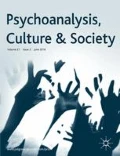Abstract
This paper examines the way in which debates over the place of psychoanalysis in psychosocial studies are developing in the British academic context, from the position of sympathetic criticism both of psychosocial studies and of psychoanalysis. The general argument is that both these approaches have real objects of study and considerable legitimacy, and that bringing them together is in principle productive. However, the loose and sometimes pious way in which psychoanalysis has been theorized within psychosocial studies has not done favours to either approach. The paper offers a critique of psychoanalytic certainty – of the type of reading of psychoanalysis that sees it as harbouring the deep truths of human nature – and utilizes the broader concept of reflexivity to suggest that psychoanalysis' contribution might usefully become more tentative and disruptive than has so far been the case.
Similar content being viewed by others
References
Billig, M. (1997). The Dialogic Unconscious: Psychoanalysis, Discursive Psychology and the Nature of Repression. British Journal of Social Psychology 36, pp. 139–159.
Bourdieu, P. (1999). The Logic of Practice. Palo Alto, CA: Stanford University Press.
Butler, J. (2005). Giving an Account of Oneself. New York: Fordham University Press.
Frosh, S. (1999). The Politics of Psychoanalysis: An Introduction to Freudian and Post-Freudian Theory, 2nd edn. London: Macmillan.
Frosh, S. (2002). After Words: The Personal in Gender, Culture and Psychotherapy. London: Palgrave.
Frosh, S. (2003). Psychosocial Studies and Psychology: Is a Critical Approach Emerging? Human Relations 56, pp. 1547–1567.
Frosh, S. (2007). Disintegrating Qualitative Research. Theory and Psychology 17, pp. 635–653.
Frosh, S., Phoenix, A. and Pattman, R. (2003). Taking a Stand: Using Psychoanalysis to Explore the Positioning of Subjects in Discourse. British Journal of Social Psychology 42, pp. 39–53.
Frosh, S. and Saville-Young, L. (2008). Psychoanalytic Approaches to Qualitative Psychology. In Willig, C. and Stainton-Rogers, W. (eds.) The Sage Handbook of Qualitative Research in Psychology. London: Sage, pp. 108–125.
Hall, S. (1996). Minimal Selves. In Baker, H., Diawara, M. and Lindeborg, R. (eds.) Black British Cultural Studies. Chicago: University of Chicago Press, pp. 114–119.
Hoggett, P. (2000). Emotional Life and the Politics of Welfare. London: Palgrave.
Hollway, W. (2006a). Paradox in the Pursuit of a Critical Theorization of the Development of Self in Family Relationships. Theory and Psychology 16, pp. 465–482.
Hollway, W. (2006b). The Capacity to Care. London: Routledge.
Hollway, W. and Jefferson, T. (2005). Panic and Perjury: A Psychosocial Exploration of Agency. British Journal of Social Psychology 44, pp. 147–163.
Hoodin, F., Kalbfleisch, K. and Thornton, J. (2004). Psychosocial Influences on 305 Adults' Survival after Bone Marrow Transplantation: Depression, Smoking, and Behavioral Self-Regulation. Journal of Psychosomatic Research 57, pp. 145–154.
Hook, D. (2008). Absolute Other: Lacan's ‘Big Other’ as Adjunct to Critical Psychological Analysis? Social and Personality Psychology Compass 2, pp. 51–73.
Lacan, J. (1956). The Quilting Point. In Lacan, J. (ed.) The Psychoses: The Seminar of Jacques Lacan Book III 1955–6. London: Routledge, pp. 258–270.
Lacan, J. (1973). The Four Fundamental Concepts of Psychoanalysis. Harmondsworth: Penguin, 1979.
Laplanche, J. (2003). Narrativity and Hermeneutics: Some Propositions. New Formations 48, pp. 26–29.
Laplanche, J. and Pontalis, J.-B. (1967). The Language of Psychoanalysis. London: Hogarth Press, 1973.
Latour, B. (2007). Reassembling the Social. Oxford: Oxford University Press.
Layton, L. (2008). What Divides the Subject? Psychoanalytic Reflections on Subjectivity, Subjection and Resistance. Subjectivity 22, pp. 60–72.
Marks, S. and Mönnich-Marks, H. (2003). The Analysis of Counter-Transference Reactions is a Means to Discern Latent Interview-Contents. Forum: Qualitative Social Research 4 (2), www.ph-freiburg.de/sozial/Marks/fqs.pdf (accessed 06 February 2008).
Nasio, J. (1992). Five Lessons on the Psychoanalytic Theory of Jacques Lacan. Albany: State University of New York Press, 1998.
Nobus, D. and Quinn, M. (2005). Knowing Nothing, Staying Stupid. London: Routledge.
Parker, I. (2005a). Lacanian Discourse Analysis in Psychology: Seven Theoretical Elements. Theory and Psychology 15, pp. 163–182.
Parker, I. (2005b). Qualitative Psychology: Introducing Radical Research. Maidenhead: Open University Press.
Perri, 6, Radstone, S., Squire, C. and Treacher, A. (eds.) (2006). Public Emotions. London: Palgrave.
Potter, J. and Hepburn, A. (2005). Qualitative Interviews in Psychology: Problems and Possibilities. Qualitative Research in Psychology 2, pp. 281–307.
Rieff, P. (1966). The Triumph of the Therapeutic. Harmondsworth: Penguin.
Rustin, M. (1995). Lacan, Klein and Politics: The Positive and Negative in Psychoanalytic Thought. In Elliott, A. and Frosh, S. (eds.) Psychoanalysis in Contexts. London: Routledge, pp. 223–245.
Rustin, M. (2002). Reason and Unreason: Psychoanalysis, Science and Politics. London: Continuum.
Stepney, E. (2003). Bourdieu on Bourdieu: Reflexive Sociology and the Sociologist in Society. Crossing Boundaries 1, pp. 126–143.
Stonebridge, L. (1998). The Destructive Element: British Psychoanalysis and Modernism. London: Macmillan.
Waddell, M. (1988). Infantile Development: Kleinian and Post-Kleinian Theory, Infant Observational Practice. British Journal of Psychotherapy 4, pp. 313–328.
Wetherell, M. (2003). Paranoia, Ambivalence and Discursive Practices: Concepts of Position and Positioning in Psychoanalysis and Discursive Psychology. In Harré, R. and Moghaddam, F. (eds.) The Self and Others: Positioning Individuals and Groups in Personal, Political and Cultural Contexts. New York: Praeger/Greenwood Publishers, pp. 99–120.
Wetherell, M. (2005). Unconscious Conflict or Everyday Accountability? British Journal of Social Psychology 44, pp. 169–173.
Wetherell, M. and Potter, J. (1992). Mapping the Language of Racism. London: Harvester Wheatsheaf.
Žižek, S. (2006). The Parallax View. Cambridge, MA: MIT Press.
Author information
Authors and Affiliations
Corresponding author
Rights and permissions
About this article
Cite this article
Frosh, S., Baraitser, L. Psychoanalysis and Psychosocial Studies. Psychoanal Cult Soc 13, 346–365 (2008). https://doi.org/10.1057/pcs.2008.8
Published:
Issue Date:
DOI: https://doi.org/10.1057/pcs.2008.8




